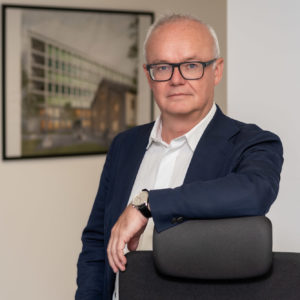:quality(80)/business-review.eu/wp-content/uploads/2023/08/dreamstime_xxl_81674115-scaled.jpg)
The local real estate industry is increasingly focused on the sustainable development and operation of property assets in the commercial and residential sectors, with investments in renewable energy capacities being one of the most visible elements of this phenomenon.
By Ovidiu Posirca
Many projects that have recently been delivered across the country feature solar panels in office and industrial buildings, heat pumps in residential developments, and alternative forms of energy for large-scale developments.
“Sustainability is still not a key driver of people moving or relocating, but the trend exists,” says Jan Demeyere, co-founder and partner at Speedwell.
Sustainable Practices Have Trackable Benefits
“It is a learning process—and it is not only about energy, but also about revitalizing urban areas with respect, on a human scale, and creating communities that will thrive. As demonstrated, we have already made a habit out of acquiring old factory sites and transforming them into quality living ensembles. Making the best use of space, existing structures, and combining the old with the new, private life with public life—all these can be achieved through a great masterplan that takes into account all aspects of life,” Demeyere explains.
At Hagag Development Europe, the approach towards sustainability is holistic, which means that the developer fulfils the needs of the current generations while anticipating the requirements of tomorrow’s life. This is done by striking a balance between economic growth, environmental care, and social well-being, according to Yitzhak Hagag, co-founder & controlling shareholder of Hagag Development Europe.
The company does this by incorporating not only environmentally friendly design techniques or materials across all its projects, but also by using modern, eco-friendly technologies where possible, straight from the concept phase.

“Nobody can deny that the refurbishment or redevelopment of old buildings or the renewal of abandoned areas are sustainable by default, especially when discussing the circular economy and climate change. What can be more sustainable than ‘recycling’ an over 80-year building by transforming it into a new, modern, energy efficient property, all while preserving its historical charm and its main architectural features or redeveloping a disaffected land plot, creating full infrastructure, green areas, and modern buildings that comply to the current international living or working standards?” Hagag says.
Some developers are planning or have already announced the introduction of net zero carbon standards for their portfolios. Among them is Romanian developer One United Properties, which is already focusing on delivering a 100% Green Homes certified residential portfolio and a 100% LEED and WELL certified office portfolio.

“All these certifications imply significant investments and attest to the sustainable operation of buildings, a minimum impact on the environment, and a safe and healthy environment for residents and tenants. Green buildings mean more than high energy efficiency, as they use fewer resources, reduce the waste generated during construction and operation phases, have a lower negative impact on the environment, and at the same time support people’s health,” argues Beatrice Dumitrascu, CEO of the Residential Division at One United Properties.
For the residential component, One United Properties will implement geoexchange systems that will lower emissions and decrease the costs of heating and cooling indoor spaces.
For many developers, building sustainably also means giving more to the community, which is translated into upgraded infrastructure and investments in schools or parks. Tracking the impact of all these investments is done through the environmental, social, and governance (ESG) framework, which is gaining prominence in negotiations for financing or leasing projects.

“Developing today without a well thought out ESG strategy is suicide,” says Speedwell’s Demeyere.
Real estate companies will have to cover the new costs linked to their ESG compliance goals. Among other aspects, this includes the measurement of biodiversity impacts and the mandatory Global Warming Potential (GWP) consideration.
Furthermore, real estate companies need to investment in their IT systems to streamline their impact reporting.
Tougher EU regulations represent one of the main drivers for the implementation of ESG strategies in the property industry. In January 2023, the Corporate Sustainability Reporting Directive (CSRD) entered into force. This new directive modernises and strengthens rules concerning the social and environmental information that companies must report. The CSRD will be applicable from 2026 to SMEs as well, which represent about 90 percent of all businesses in the EU.
“Also to be considered is the EU Commission’s proposal for the revision of the Energy Performance of Buildings Directive, in the sense that starting 2030 all new buildings should be zero-emission buildings (ZEB), an upgrade from the Nearly zero-emission building (NZEB) standard, in force since 2021,” says Alexandru David, head of research at JLL Romania.
For real estate companies, GRESB benchmarking is an essential point to be covered when starting an ESG strategy.
In the case of Romanian developer Redport Capital, the construction of sustainable communities is a process that includes several components.

“First and foremost, we prioritise environmental sustainability by implementing eco-friendly practices and promoting renewable energy sources. This includes incorporating energy-efficient technologies such as solar panels, heat pumps, smart house – smart building – smart city systems, and other energy saving systems into our buildings and infrastructure. Additionally, the developer’s projects incorporate common areas, parks, and green spaces where residents can come together, strengthening social bonds. “Last but not least, we prioritise economic sustainability by promoting local businesses and job creation in collaboration with different retailers, supporting the new residential community,” says Cosmin Savu-Cristescu, founder of Redport Capital.
On the financing side, the first green loan granted by the IFC, a World Bank member, went to Romanian developer IULIUS for the Palas Campus Iasi office project. The building is also undergoing a double green certification: LEED and EDGE. The developer is also working with the IFC on a strategy to cut carbon emissions across its portfolio. IULIUS has also installed solar panels on top of its eight properties in Romania, which should generate 10 percent in energy savings yearly. The company is also looking to achieve a zero waste to landfill target by improving collection at the source and increasing the percentage of waste recovery.

“Our focus on people’s wellbeing encompasses our commitment to reduce pressure on the environment, which is a priority,” says Dan Adrian Chelaru, group sustainability officer at IULIUS.
Main Drivers of ESG Strategies
The future development of ESG strategies for property companies in Romania is driven by a mix of occupier centricity, space convenience, efficiency reputation building, and tenant retention.
Valeriu Toma, head of property management at CBRE Romania, points out that embracing ESG principles not only aligns with global sustainability goals but also brings tangible benefits to property companies and their stakeholders.

“There is a strong emphasis on the “S” (social) and “G” (governance) aspects of ESG, which should complement the environmental focus. Property companies are adopting a professional approach to meet ESG requirements and demonstrate their commitment to sustainable practices. This holistic approach, that takes all three ESG pillars into account, reflects a 360-degree concern for ESG issues, driven by the common interests of all stakeholders,” Toma explains.
Moreover, there is an emerging mindset that encourages property companies to align their strategies with ESG principles and work towards tangible outcomes. Developing environmentally friendly and socially responsible buildings enhances a developer’s standing as an industry leader. This positive reputation not only attracts new business and investment but also inspires others in the industry to follow suit, creating a ripple effect of sustainable practices, according to Toma. He concludes by saying that tenants are increasingly seeking buildings that prioritise ESG metrics.
“Companies in sectors such as technology and finance place particular importance on ESG reputation as part of their brand identity. By incorporating ESG principles, real estate companies can cater to tenant demands and enhance tenant satisfaction, leading to stronger tenant retention rates,” says the CBRE Romania expert.



:quality(80)/business-review.eu/wp-content/uploads/2024/03/Screenshot-2024-03-14-at-12.55.37 PM.png)




:quality(80)/business-review.eu/wp-content/uploads/2024/02/IMG_6951.jpg)

:quality(80)/business-review.eu/wp-content/uploads/2024/04/COVER-1.jpg)



:quality(50)/business-review.eu/wp-content/uploads/2024/03/ileana-mitrache.jpg)
:quality(50)/business-review.eu/wp-content/uploads/2024/02/SkyTower_Bucharest_picture_-4-Copy.jpg)
:quality(50)/business-review.eu/wp-content/uploads/2024/02/Small_NEAN4613-e1708447666236.jpg)
:quality(80)/business-review.eu/wp-content/uploads/2024/04/cover-april.jpg)
:quality(50)/business-review.eu/wp-content/uploads/2024/04/FOT_9989-7-scaled.jpg)
:quality(50)/business-review.eu/wp-content/uploads/2023/08/One-Floreasca-City-2-scaled.jpg)
:quality(50)/business-review.eu/wp-content/uploads/2024/04/ROMTEXTIL-2.jpg)